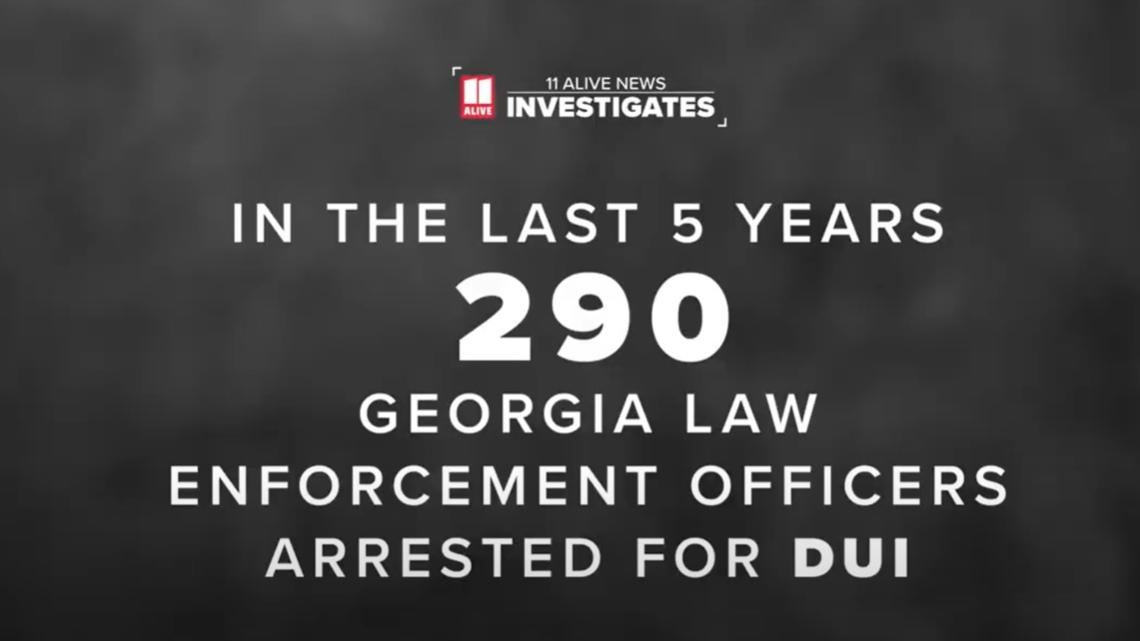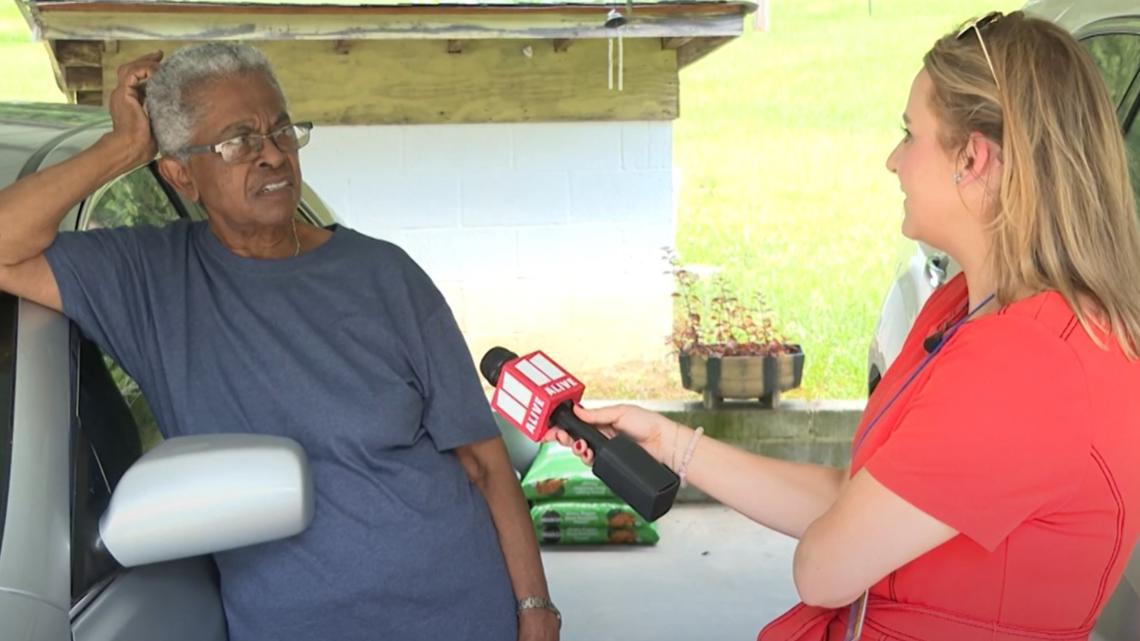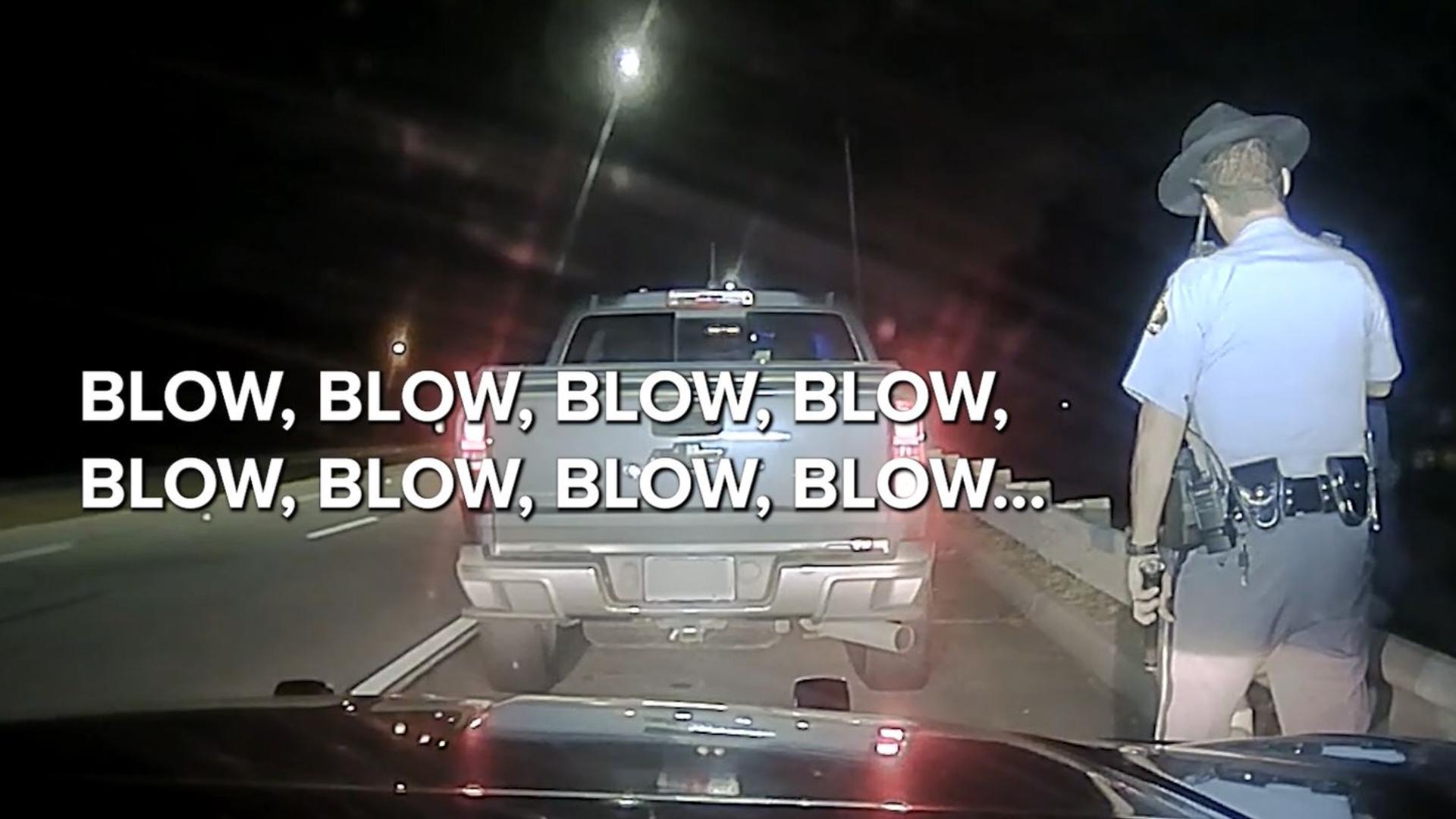ATLANTA — Every 39 minutes, someone in the United States dies in a drunk driving crash, according to the National Highway Traffic Safety Administration.
But what happens when those sworn to protect and serve, while keeping drunk drivers off the roads, are themselves a danger behind the wheel?
In the last five years, 290 Georgia POST-certified law enforcement officers have been arrested for driving under the influence (DUI), according to data compiled by 11Alive Investigates.
Georgia POST, or the Peace Officers Standards and Training Council, is the regulatory agency that sets training standards for all law enforcement officers in the state, including police officers, sheriff's deputies, corrections officers, and parole officers.
The agency also has the power to investigate wrongdoing and determine whether an officer should have their POST certification revoked, according to Deputy Executive Director Chris Harvey.
A revocation would mean that the officer could no longer work in law enforcement in the state.
"If an officer is charged with a with a crime, they may be found not guilty at trial," Harvey explained. "However, the council might look at the conduct and say, well, even though it didn't meet the legal criteria for a conviction, we've got concerns about this conduct."
Officers may have their certifications revoked for a number of reasons, Harvey explained, including excessive force, sexual harassment, or untruthfulness.
However, he said POST does not generally view a DUI arrest as a reason to revoke an officer's certification.
"This council has taken a basic position that if an officer is involved in a DUI they're generally given a chance to accept probation, pay a fine, usually attend some drug or alcohol awareness training, and then continue on with their career," he said.
Of the 290 officers who have been arrested for DUI in the past five years, 30 eventually had their POST certifications revoked because of it. The other 260 were allowed to remain in law enforcement.


In Georgia, any additional reprimands are at the discretion of the agency employing them.
11Alive Investigates requested and reviewed the investigative files of the officers arrested for DUI to determine how local agencies handled each case.
The reprimands varied widely, even among the same agencies. Many officers did not face any formal reprimand from their agency at all, aside from the required probationary period, during which they are still paid and allowed to work.
In 28 percent of the cases, the officer was able to voluntary resign from their position. Of those, several returned to law enforcement at a different agency.
In 18 percent of cases, the officer was terminated by their agency.
Our team also reviewed 11 individual cases where an officer took an early retirement - sometimes days or weeks after their arrests took place.
The photos below are an example of intent for retirement following an arrest.
In about a dozen other cases, officers were demoted or moved to a civilian position within the department.
The punishment for several corrections officers arrested for DUI was a 5 percent pay decrease for the next year.
In one case from April 2023, a Gwinnett County deputy was reportedly driving his patrol car to work while under the influence of alcohol. He veered off the road and slammed into a cluster of residential mailboxes, then drove off as seen in dash camera video shared below.
According to the agency's investigative records, that deputy was questioned about the damage to his patrol vehicle but claimed he "did not know what he hit." His superior reported the smell of alcohol, so a breath test was administered. The deputy blew a .142. He was formally terminated a week later and had his POST certification revoked.
When 11Alive Investigates went to interview the owners of the smashed mailboxes, they said they'd never been told a law enforcement officer under the influence had been the culprit.
"I'm just shocked to find out that there was an officer even involved in doing it, and they're supposed to uphold the law," said one neighbor who asked not to be named. "They are arresting other people for it, and then they get off with a slap on the wrist."


In many other cases, officers arrested for DUI remain actively employed with their departments pending the criminal or internal investigations, which may take well over a year.
According to police and POST records, in March 2023, an officer with the Atlanta Police Department tested positive for alcohol via a breath test after crashing his vehicle down an embankment. The responding DPS trooper also noticed an open bottle of alcohol in the crashed vehicle, and reported the officer driving had "bloodshot watery eyes and slurred speech," and "could not follow simple instructions." The report also states the officer initally pretended not to speak English, although he later spoke in fluent English.
The report states the trooper brought the officer to a nearby hospital for a blood draw to confirm his blood alcohol level. Moments later, a nurse reported the offending officer had fled the hospital and disappeared into the woods behind the building. Troopers later located him at a nearby gas station, where he was arrested for DUI, open container, and improper driving.
As of July 2024, that officer was still actively employed with the Atlanta Police Department as a field operations sergeant in Zone 6. His POST certification is still listed as active.
A spokesperson for APD declined to release their internal investigative files to 11Alive Investigates, citing the fact that the case was still open.
The APD spokesperson said their protocol for an officer arrested for DUI initially includes a transfer to administrative duty with pay pending judicial adjudication, and prohibition from driving city vehicles. If convicted, APD policy generally recommends a 21 day suspension, depending on the circumstances.
When asked why the punishments vary so widely from agency to agency, Harvey said it's because in Georgia departments are considered autonomous, with the ability to set their own standards for things.


“The fact that an officer may be involved in DUI is something that really should be looked at, but it's something that the people do all the time," Harvey said.
He added that without some legislative action, there's no way to standardize the way departments reprimand officers for DUI arrests or convictions.
“I do think the public has the right to know that the people that are doing this job are held to a high standard in Georgia," he said. "Police officers are not above the law."
Although the punishments are usually temporary for officers arrested for DUI, the consequences for victims are if not life-ending then certainly life long.
It's a suffering Jeanine Melvin knows all too well.


The 50-year-old grandmother was driving to her job as a flight attendant when a 22-year-old impaired driver crashed into her head-on.
"It just seemed like out of nowhere, this car came, and bam, I'm hit," she recalled. "The pain was unexplainable, I mean to the point where I would rather just die."
Court records show the driver who hit Melvin was later convicted and spent 30 days in jail for the DUI. That driver had the most basic insurance coverage allowable by law, so Melvin said she only saw a few thousand dollars in restitution; a miniscule drop in the bucket compared to the six-figure pile of hospital bills she's accumulated in the year since.
"I went from working to take care of my family to my family having to take care of me," she said. "I went from paying my bills to now, bill collectors calling down every single day and I just don't have it."
Melvin set up an online fundraiser to help sustain her while she's still too injured to return to work. She no longer needs a wheelchair full-time but still struggles to stand for long periods of time. Her most recent surgery, in July 2024, has left her in a leg brace. She's permanently lost the full functionality of her foot.
“When you're always used to being independent, and now you have to be dependent, that's the hardest part," she said through tears. "That's where the the anger somewhat comes in and I try not to let it cause me to be depressed or anything."
She said she hopes her story resonates with people who might not consider the consequences of driving impaired.
"I'm losing out on my family, my career, my days, because of someone else's negligence," she said. "Other victims, all they were doing was trying to get to work, to get to a place that was going to help them provide for their families and themselves, and now it's all over. And I'll be honest with you, I don't think that's fair at all."
11Alive Investigates reached out to more than a dozen metro-area law enforcement agencies to request their policies surrounding DUI arrests of employees. Their responses are in the carousel below.

